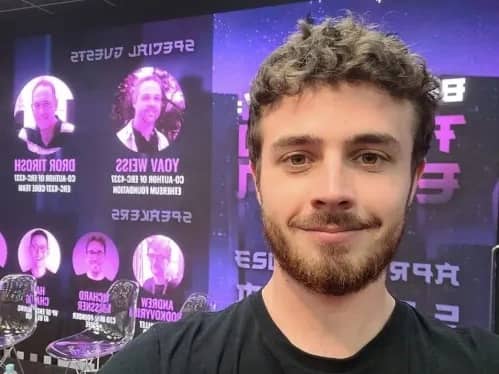订阅 wiki
Share wiki
Bookmark
Nicolas Consigny
0%
Nicolas Consigny
Nicolas Consigny 是一位法国软件开发者和以太坊基金会(Ethereum Foundation)的隐私研究员。他以领导链上隐私框架项目Kohaku的开发而闻名,并且曾担任Railgun DAO隐私协议的核心贡献者和协调员。[1] [2] 他的工作重点是将保护隐私的技术集成到核心以太坊生态系统中,以增强用户的安全性和保密性。[3]
职业生涯
早期工作和 Railgun DAO
在正式加入 以太坊基金会 之前,Consigny 是 RAILGUN DAO 的核心人物,他在那里担任核心贡献者和协调员。[3] [1] RAILGUN 是一个建立在 以太坊 和其他 以太坊虚拟机 (EVM) 兼容区块链上的去中心化隐私协议。它的智能合约系统使用零知识证明 (zk-SNARKs),允许用户进行私密交易并与 去中心化金融 (DeFi) 应用程序交互。这项技术通过混淆交易细节(包括发送者、接收者和金额)来防止在区块链上公开查看。[3] [1]
作为协调员和发言人,Consigny 的职责包括组织开发工作,沟通协议的战略方向,并与更广泛的 以太坊 社区联络。[3]
Railgun 项目在 2024 年 4 月受到了广泛关注,此前 以太坊 联合创始人 Vitalik Buterin 使用该协议进行了隐私保护的 ETH 转账。Buterin 随后公开发布了关于此类工具重要性的帖子,称隐私是“以太坊 的头等大事”。[2] 这一认可提高了该项目的知名度。Consigny 当时在接受 The Defiant 采访时评论说,Buterin 的行为是“自发的和未经请求的”,并且是链上隐私必要性的“最强烈的信号”。他补充说,这一事件“验证了我们关于公共区块链上迫切需要强大的隐私解决方案的整个论点”。[2]
Ethereum Foundation
Consigny的工作转变为加入以太坊基金会后,在以太坊生态系统中更嵌入的角色。他公开的角色包括开发者协调员,以及后来专注于隐私的开发者和研究员。 [4] [1]
开发者协调员
到2024年中期,Consigny担任开发者协调员,负责以太坊协议开发的组织和沟通方面的工作。在2024年7月“Big Talk”播客的采访中,他对以太坊的技术路线图和战略挑战进行了全面概述。他讨论了重新质押协议的机制和影响、降低网络交易费用的持续工作、分片技术的开发状态,以及Vitalik Buterin提出的名为“终局”的长期架构愿景。他还谈到了区块链领域的竞争动态,例如“Layer 1之战”和比特币上的Layer 2概念,同时坚持认为以太坊的Layer 2解决方案不会从主链中抽取价值。 [4]
隐私研究员和开发者
在2025年末,他的角色变得更加专业化,成为以太坊基金会隐私团队(@EF_Privacy)的成员。他的工作是以基金会内新成立的倡议“隐私集群”的一部分,该集群于2025年10月8日宣布成立。该小组由47名工程师、研究人员和密码学家组成,旨在与现有的隐私和扩展探索(PSE)团队合作,加速以太坊协议中隐私增强技术的开发和集成。他对Kohaku项目的领导是这项任务的核心部分。 [1]
主要项目
Kohaku项目
截至2025年10月,Consigny是Kohaku项目的首席开发者,该项目是一个链上隐私框架、浏览器扩展钱包和软件开发工具包(SDK),在以太坊基金会内开发。该项目是与以太坊联合创始人Vitalik Buterin的直接合作项目。 [1] [5]
公告与使命
Kohaku 项目于 2025 年 10 月 9 日通过 X(前身为 Twitter)上的一篇文章正式宣布。在一份联合声明中,Consigny 和 Vitalik Buterin 被称为“Kohaku 的代表”。Consigny 用以下声明阐明了该项目的核心使命:“现在是我们公开的时候了,这样你们都可以私下进行,现在是我们大胆的时候了,这样你们都可以安全。” [5]
正如 Consigny 所阐述的那样,该项目的指导原则是强制执行交易极简主义,以提高用户安全性。他表示:“Kohaku 旨在确保交易的每一方只了解该交易直接需要的知识,并暴露于发生该交易所需的绝对最小风险集合。”这一理念在 Consigny 撰写的项目官方路线图文件中得到了详细阐述。 [1] [2]
目标和功能
Kohaku 路线图概述了一个三管齐下的策略,旨在将隐私集成到 Ethereum 用户体验中。该项目不仅被设计为一个独立的工具,而且是更广泛的开发者生态系统的基础层。主要目标是: [2]
- 创建 SDK: 生成一个强大的软件开发工具包,为应用程序开发者提供一套可访问的、强大的隐私和安全原语。
- 开发参考钱包: 构建一个功能丰富、面向高级用户的钱包,作为演示 SDK 全部功能的参考实现。
- 推动生态系统采用: 积极与现有钱包团队和去中心化应用程序合作,以鼓励集成 Kohaku SDK。
该工具包的初始开发重点是日常用户的实用隐私功能。这些功能包括资产的私密发送和接收、使用零知识工具(如 ZKemail 和 ZKpassport)的高级社交恢复机制,以及绕过中心化远程过程调用 (RPC) 节点的可选点对点 (P2P) 交易路径。作为对其先前工作的致敬,Railgun DAO 被列为 Kohaku 计划的合作者。 [2]
公开发布
Project Kohaku 的正式公开亮相计划于2025年11月。这包括钱包的发布、公开演示以及用于测试的SDK的发布。发布活动以在阿根廷布宜诺斯艾利斯举行的 Devcon 2025为中心。Consigny计划在2025年11月17日至22日举行的Devconnect ARG开发者大会上现场演示 Kohaku 工具包的功能。 [1] [2]
技术贡献与观点
协议协调与开发
Consigny 作为 以太坊 生态系统中的协调员的角色,通过他在 GitHub 上的积极贡献得到证实。他参与了 ethereum/pm 存储库,该存储库包含以太坊所有核心开发者和共识层调用的议程和会议记录。这一活动表明他参与了指导以太坊持续发展的核心组织和项目管理流程。 [3]
他的工作还扩展到协议标准化流程。他积极管理 以太坊 改进提案 (EIP) 和 Rollup 改进提案 (RIP) 存储库的分支,这些对于审查、讨论和正式化对 以太坊 协议及其不断增长的 Layer 2 生态系统的更改至关重要。 [3]
除了协调之外,Consigny 还直接做出技术贡献。2025 年 11 月 6 日,他在 ethereum/forkcast 存储库中打开了一个 pull request,以添加 EIP-8052,表明参与了协议升级管道。他的工作还显示了他的 以太坊基金会 角色与他专注于隐私的项目之间的直接联系。例如,2025 年 11 月 3 日,他审查了 ethereum/kohaku 存储库中引入 Railgun 测试的 pull request,说明了两个隐私计划之间的技术集成。他的 GitHub 个人资料还表明他是区块链领域其他几个组织的成员或贡献者,包括 , , , 和 。 [3]
倡导链上隐私
Consigny 在不同的角色中,一直倡导在公共区块链上实现强大的隐私保护。他认为隐私不是一个小众功能,而是用户安全、商业机密以及加密货币为主流采用而成熟的根本必要条件。 [2]
在公开评论中,他区分了隐私和保密,认为链上隐私的目标不是为了促成非法活动,而是在完全透明的数字世界中建立基本的人权和商业权利。他认为隐私是 以太坊 实现其成为适用于各种现实世界应用的全球结算层的目标所必需的组成部分。这种观点在他的 Kohaku 项目使命宣言以及他对 Railgun 等协议重要性的公开评论中显而易见。 [5]
公开露面
The Big Whale Podcast (2024年7月)
2024年7月,Consigny参加了The Big Whale的“Big Talk”播客,讨论了以太坊的未来。他以以太坊基金会开发者协调员的身份,详细阐述了技术路线图、基金会的作用以及以太坊网络在更广泛市场中的地位。讨论主题包括:[4]
- 以太坊作为创新驱动力的持续作用。
- 分片技术的开发状态和降低交易费用的时间表。
- 重新质押的承诺和潜在问题。
- 民主化网络参与的策略,包括单独验证的话题。
- 以太坊基金会的财务分配和支出。
这次采访详细了解了他在公开宣布Kohaku项目之前对以太坊生态系统的理解。
Devcon 2025 和 Devconnect ARG
Consigny计划于2025年11月在布宜诺斯艾利斯举行的Devcon 2025和随附的Devconnect会议上展示Kohaku项目。预计演示将包括Kohaku钱包的现场演示及其面向开发者的SDK概述,标志着该项目的正式公开亮相。 [1] [2]
发现错误了吗?
